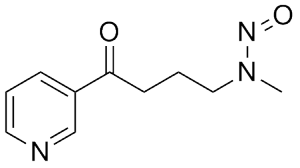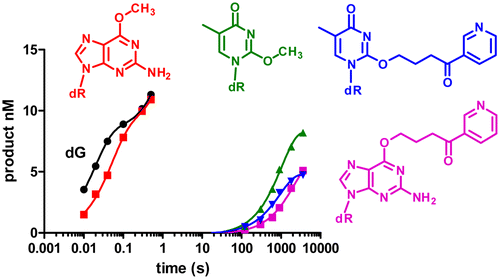We have an article just published
DNA Polymerase ν Rapidly Bypasses O6-Methyl-dG but not O6-[4-(3-Pyridyl)-4-oxobutyl-dG and O2-Alkyl-dTs
A. S. Prakasha Gowda and Thomas E. Spratt
Chem. Res. Toxicol., 2016, 29 (11), pp 1894–1900
 4-(Methylnitrosamino)-1-(3-pyridyl)-1-butanone (NNK) is a potent tobacco carcinogen that forms mutagenic DNA adducts including O6-methyl-2′-deoxyguanosine (O6-Me-dG), O6-[4-(3-pyridyl)-4-oxobut-1-yl]-dG (O6-POB-dG), O2-methylthymidine (O2-Me-dT), and O2-POB-dT. We evaluated the ability of human DNA polymerase ? to bypass this damage to evaluate the structural constraints on substrates for pol ν and to evaluate if there is kinetic evidence suggesting the in vivo activity of pol ν on tobacco-induced DNA damage. Presteady-state kinetic analysis has indicated that O6-Me-dG is a good substrate for pol ν, while O6-POB-dG and the O2-alkyl-dT adducts are poor substrates for pol ν. The reactivity with O6-Me-dG is high with a preference for dCTP > dGTP > dATP > dTTP. The catalytic activity of pol ν toward O6-Me-dG is high and can potentially be involved in its bypass in vivo. In contrast, pol ? is unlikely to bypass O6-POB-dG or the O2-alkyl-dTs in vivo.ν
4-(Methylnitrosamino)-1-(3-pyridyl)-1-butanone (NNK) is a potent tobacco carcinogen that forms mutagenic DNA adducts including O6-methyl-2′-deoxyguanosine (O6-Me-dG), O6-[4-(3-pyridyl)-4-oxobut-1-yl]-dG (O6-POB-dG), O2-methylthymidine (O2-Me-dT), and O2-POB-dT. We evaluated the ability of human DNA polymerase ? to bypass this damage to evaluate the structural constraints on substrates for pol ν and to evaluate if there is kinetic evidence suggesting the in vivo activity of pol ν on tobacco-induced DNA damage. Presteady-state kinetic analysis has indicated that O6-Me-dG is a good substrate for pol ν, while O6-POB-dG and the O2-alkyl-dT adducts are poor substrates for pol ν. The reactivity with O6-Me-dG is high with a preference for dCTP > dGTP > dATP > dTTP. The catalytic activity of pol ν toward O6-Me-dG is high and can potentially be involved in its bypass in vivo. In contrast, pol ? is unlikely to bypass O6-POB-dG or the O2-alkyl-dTs in vivo.ν
